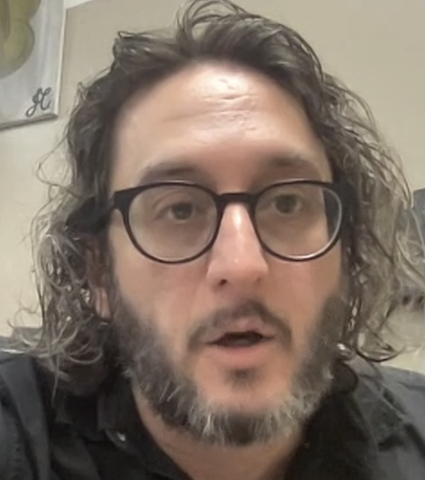The sudden resignation of Ms. Ford last year prompted many concerns as many wondered who would take her position to teach students about Government and Economics. Would Neuwirth hire a new teacher? No, it turns out the solution to the problem was here all along. Mr. Falzone took the position and began his transfer from 11th-grade to 12th-grade teacher. But why did he transfer?
As I was interviewing Mr. Falzone, I was told by many - such as Mr. Bragg and the interviewee himself - about the difficulty of interviewing Mr. Falzone for this profile story. “Just note that I have been told I'm not a good person to interview” quipped Falzone while sipping coffee. Knowing these challenges, I still took the opportunity to take on this story.
As the interview started, Mr. Falzone was getting prepared to answer my questions. I had to start by asking questions regarding his overall experience as a 12th-grade teacher. Fazlone thought about this question for a bit and responded that the most difficult part of teaching was time constraints and tons of units to teach.
Throughout our interview, I wanted to ask personal questions and what interested him in teaching government. So I started by asking what major he took at university. Falzone replied with “Political science”. I tried to understand why he chose that major instead of the other major. Falzone replied eagerly by saying “I have an interest in why people make decisions," which is why he wanted to be a social scientist. As the conversation continued, Falzone even stated he would have taken economics or sociology as other majors since they relate to decision-making. These questions sparked Fazlone's interest in decision-making “What does power mean"
Fazlone hadn't applied for this position in the first place; “Winchell was the one who told me to apply for this position." So wanting to discover more about this revelation, I talked to Mr. Winchell. Falzone suggested that I ask his supervisor questions like “How long until he gets fired?” and “Where does he fail?” Mr. Winchell responded eagerly to Falzone’s suggested questions with a smile on his face - he failed in “Fashion and Fitness” and that he'd be fired "in four or five days, kidding. Never”. After asking these ironic questions, we discussed why he recommended Falzone for this position. He spoke about “His teaching style is important for seniors to experience” and “He has a passion for politics, which we found valuable”.
I wanted to understand what Winchell meant by “His teaching style is important for seniors to experience”. So I did another interview with Falzone. I asked about the influence of his teaching style on students. Falzone took his time (to the surprise of no one) to explain his teaching style. Some may know Falzone for his adapting changes to meet a variety of learning styles, and I tried to get a sense of where he got that mindset of change. He responded, "Things I attempt to do and see what they are doing in other classes. And see what other teachers are doing. And try to find different ways to do it. Present them with different ideas. Different strategies. Not because other teachers aren’t doing their job. But to give more ideas to students.”
Where many journalists who came before me were afraid to take the challenge of cracking the Falzone nut, I took this challenge and came to understand and appreciate him as more than a history teacher. His transition wasn’t just a career shift but a fulfilling journey, filled with his passion for politics and learning. There were challenges on the road, but he conquered them. As we seniors are about to leave and head out to the real world, it’s important to value Falzone's teaching style, as he prepared us for the next step in the real world.











Commentaires